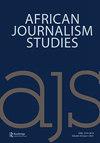非洲土著语言媒体研究:得失,走向新的研究议程
IF 1.8
3区 文学
Q3 COMMUNICATION
引用次数: 2
摘要
对非洲土著语言媒体的研究经常被忽视,原因有几个,比如对使用殖民语言英语、法语和葡萄牙语的主流媒体的研究痴迷,以及普遍缺乏学术兴趣。这篇半系统的综述论文着眼于过去二十年的研究轨迹,找出差距并提出新的研究议程。从文化研究和批判理论的角度进行的现有研究揭示了土著语言媒体与性别和健康传播的交叉;民主与发展;经济与管理;和数字化。本文提出了一个遵循批判理论传统的扩大的新研究议程,以批评主流媒体的主导地位,并提出了一个赞赏非洲土著语言媒体重要性的非殖民化改革议程。建议研究土著语言媒体的新案例研究、表现形式、受众、商业模式、创新和数字新闻。本文章由计算机程序翻译,如有差异,请以英文原文为准。
Indigenous-language Media Research in Africa: Gains, Losses, Towards a New Research Agenda
ABSTRACT Research on indigenous-language media in Africa is often neglected for several reasons, such as an obsession with research on mainstream media that uses colonial languages of English, French and Portuguese and a general lack of scholarly interest. This semi-systematic review paper looks at the research trajectory of the last two decades, identifying gaps and proposing a new research agenda. Available research conducted from a cultural studies and critical theory perspective reveals the intersection of indigenous-language media with gender and health communication; democracy and development; economics and management; and digitalisation. A broadened new research agenda that follows the critical theory tradition is proposed to critique the dominance of mainstream media together with a decolonial reform agenda that appreciates the importance of indigenous-language media in Africa. Research highlighting new case studies, representations, audiences, business models, innovation and digital journalism by indigenous-language media is proposed.
求助全文
通过发布文献求助,成功后即可免费获取论文全文。
去求助
来源期刊

African Journalism Studies
COMMUNICATION-
CiteScore
1.90
自引率
10.00%
发文量
18
期刊介绍:
Accredited by the South African Department of Higher Education and Training for university research purposes African Journalism Studies subscribes to the Code of Best Practice for Peer Reviewed Scholarly Journals of the Academy of Science of South Africa. African Journalism Studies ( AJS) aims to contribute to the ongoing extension of the theories, methodologies and empirical data to under-researched areas of knowledge production, through its emphasis on African journalism studies within a broader, comparative perspective of the Global South. AJS strives for theoretical diversity and methodological inclusivity, by developing theoretical approaches and making critical interventions in global scholarly debates. The journal''s comparative and interdisciplinary approach is informed by the related fields of cultural and media studies, communication studies, African studies, politics, and sociology. The field of journalism studies is understood broadly, as including the practices, norms, value systems, frameworks of representation, audiences, platforms, industries, theories and power relations that relate to the production, consumption and study of journalism. A wide definition of journalism is used, which extends beyond news and current affairs to include digital and social media, documentary film and narrative non-fiction.
 求助内容:
求助内容: 应助结果提醒方式:
应助结果提醒方式:


